The Twilight Zone is a show that features alien invasions, the afterlife, haunted dolls, ghosts, existential crises, deals with the devil, and horrible, horrible endings. It’s a show about the worst of humanity, and the things that can happen to us if we make wrong choices. It’s a show that, if we think about it, can be pretty scary.
And yet, it is not a horror show. At least, not exclusively. To be honest, it’s kind of hard to pin down.
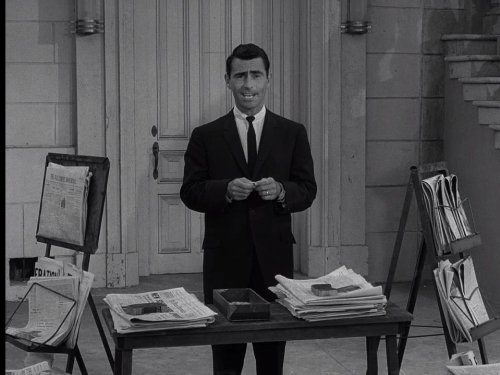
Like I’ve mentioned in other ‘genre’ articles on this blog, the genre of a work is tied to the characters, chiefly the protagonist, of any given television show or film. Luke Skywalker is the defining reason that Star Wars is a fantasy. Jack Burton makes Big Trouble in Little China a comedy (We think). The Addams Family is a comedy due to the interactions of the ‘creepy’ family.
But The Twilight Zone? It’s an anthology. In other words, we don’t have a consistent protagonist. It changes from week to week. This means we have to look solely at the style of stories. The bad news?
The stories change from week to week as well.
The good news?
The stories may change, but something does unify them: the style.
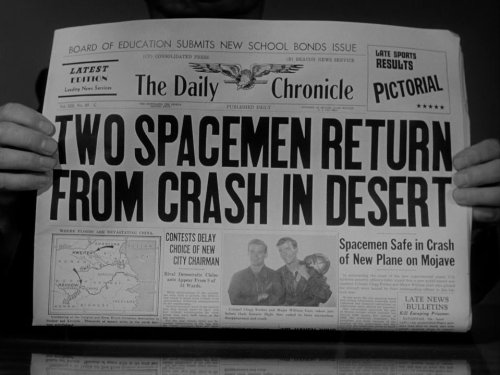
As I mentioned in the ‘story’ article, the basic story beats of a traditional Twilight Zone episode remain largely the same: an ordinary protagonist finds themselves in a horrific situation that forces them to come to terms with their own humanity and the world they live in.
Well, that settles it, you might say. It’s clearly a horror show, isn’t it? Why do you have to make everything difficult?
To be fair, The Twilight Zone does have quite a lot of elements also shared with the horror genre. The horrible, hopeless scenarios that the protagonists typically find themselves in have quite a lot in common with equally bleak horror film endings. The terrifying end of The Dummy, The New Exhibit, or the episode Number 12 Looks Just Like You are classic examples of the ‘horror’ of The Twilight Zone, but elements of most episodes can seem to be classified that way. From the eerie events, to the slow build of dread-filled atmosphere, to the sometimes terribly unhappy conclusions, The Twilight Zone was excellent at preying on the things humanity is the most afraid of, and using them as excellent methods of storytelling. These elements, while ‘unrealistic’, showcased our greatest fears: loss of personhood, isolation, death, the Unknown, and many other things that keep us up at night. While sometimes the heroes would get away in the end, often, the conclusions were bleak and dark as our protagonist faces their fate, be it eternal imprisonment, a life of isolation in the fallout of a nuclear holocaust, trapped as a wax figure, or total insanity.
So yes, The Twilight Zone is a horror series. But it’s more than that.
If the stories were merely horrible things happening to undeserving people, The Twilight Zone would indeed be purely a horror show, but they’re not. Remember the whole ‘coming to terms with their own humanity’? That’s where the science-fiction comes in.
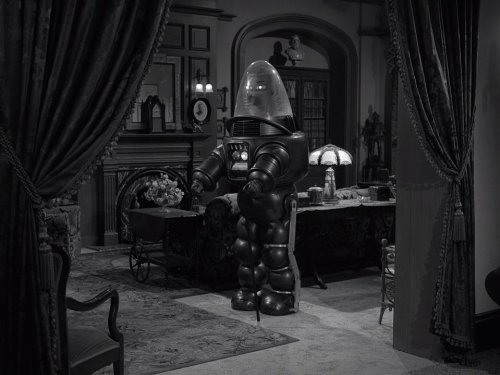
More than the aliens, future-set episodes, and alternate universes, a science-fiction story has a lot to do with exploring humanity from the outside. That way, controversial topics can be covered in a way that doesn’t seem close to home, instead taking place in totally unbelievable circumstances. Since the beginning of science-fiction, the genre is heavily focused on what makes us human, and how it relates to things we aren’t used to dealing with, and that’s what The Twilight Zone is all about.
The things we’ll do for money. The terrible things we’ll sink to when we’re afraid. The show was more about the ‘scare factor’ of being invaded, of being identical to someone capable of destroying our lives, of facing down death. The show was about us. People. The Twilight Zone is speculative fiction at its finest, forcing us to think about our identities as human beings. Many episodes of the show were about prejudice, nuclear fallout, or the Red Scare, concepts that the audience could understand without immediately feeling like the show was trying to tell them something about society, even though it was. Rod Serling’s Aesop of the episode was typically pointed out in the ending, but after the audience had time to think about what they just saw.
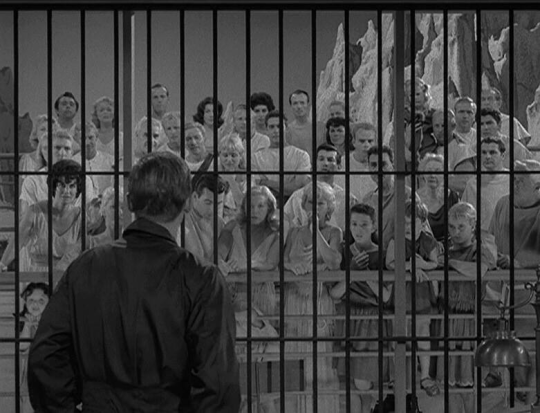
Okay, so it’s a sci-fi/horror anthology, we’ve gotten that narrowed down. Most people usually categorize The Twilight Zone that way, so, if we wanted, we could call it a day right away. But there’s a little more to it than that.
Like I’ve said in previous ‘genre’ articles, every work of fiction is a blend of elements of more than one genre. Alien is science-fiction/horror (more on that in the next edition of The Legacy of Sci-Fi), Buffy the Vampire Slayer is action-horror-comedy. The same holds true for The Twilight Zone, including more than the two genres we’ve already settled on above. There are even some elements that, while not being large enough to use as grounds to categorize it in certain genres, are worth taking a look at.
The Twilight Zone, like I’ve mentioned numerous times, is focused and centered on people. On humanity itself, sure, the idea of people, but there’s also a focus on individuals, and their experiences. Their fears, hopes, successes and failures, their interactions. These are elements of drama, even though I’d be hard pressed to categorize the show this way. The aspects of drama as used in this show, while not using them in the same way as a traditional drama would, does rely on them to further the audience’s ties to each protagonist, making the horror affect us considerably more than if we were watching a blank slate.
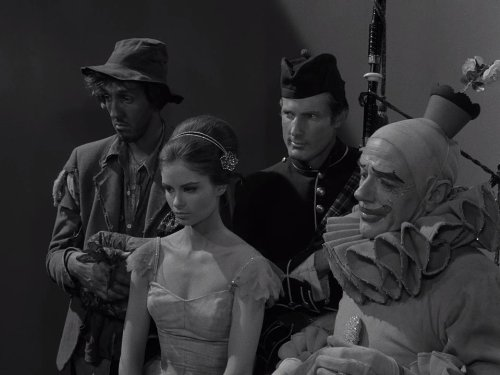
The odd events that happen to the characters are rarely explained right-out. Often, the protagonist has to figure out whether they’re going insane, or in some other way getting to the truth of the matter. This is an element of suspense and mystery, tactics which feed directly into the horror aspect, by drawing the audience in further.
These other genre tactics, as you might have realized, are deliberately set up to bring the audience closer to the action. As an anthology, there is no ‘unifying’ setup or characters for the viewers to be familiar with, and as a result, each episode must use different tactics in order for the audience to relate to and care about this new character and scenario.
Then, of course, there is the final genre, one that can perhaps be the most loosely connected with the show: that of fantasy.
Fantasy typically brings to mind sword-and-sorcery stories like Conan the Barbarian, or epic tales like The Lord of the Rings, but in reality, ‘fantasy’ is, to quote the dictionary, ‘a genre of imaginative fiction involving magic and adventure, especially in a setting other than the real world’. By that logic, there are more than a few episodes of The Twilight Zone that fit that description.
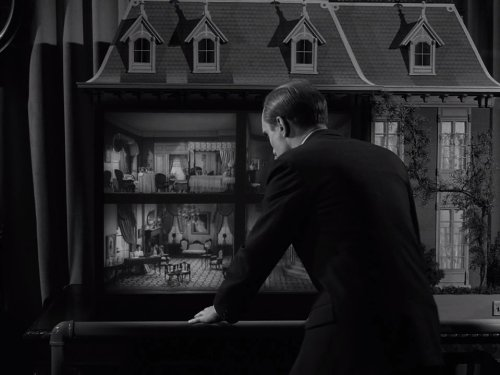
A World of His Own, A Game of Pool, and Walking Distance are just a handful of the episodes that seem to have more ‘magical’ qualities than horrific. There are plenty of storylines in The Twilight Zone that, not only (sometimes) ending happily, but have a distinct ‘whimsical’ feel to them rather than the dread of something terrible happening. (Of course, sometimes something terrible does happen, but again, a different type of horrible than Living Doll.) Episodes like The Hunt or The Night of the Meek don’t sacrifice the ‘twist ending’ that The Twilight Zone is so well-known for, but does it in a more whimsical, fantastical way. No aliens, no futuristic settings, just the human imagination making for some unique storytelling.
Science fiction. Horror. Drama. Mystery. Fantasy. The Twilight Zone is all of these, and sometimes, a little more. By mixing these genres in unique blends with equally unique storylines, Rod Serling’s scripts came to life with fresh ideas and story styles that hold the show up as a genre-buster, even to this day. It’s a show that can appeal to almost everyone who doesn’t mind being kept up at night, a show that makes you think, as well as jump at things that go bump in the night.
It is this element, this clever combination of various storytelling styles and ideas, that has made The Twilight Zone an unforgettable chapter in television history, even to this day.
Thank you guys so much for reading! Don’t forget that my ask box is always open for conversation, suggestions, or questions. Stay tuned for the next article, where we’ll be looking at the character styles of The Twilight Zone. I hope to see you there!